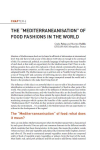Palma G., Padilla M. (2012). The "mediterraneisation" of food fashions in the world. In : Mombiela F. (dir.), Abis S. (dir.). Mediterra 2012 : the Mediterranean diet for sustainable regional development.
Paris (France) : Presses de Sciences Po.
p. 133-151.
(Mediterra, n. 13).
Chapter 6. Part 2 : Food and sociocultural dynamics.
| Titre : | The "mediterraneisation" of food fashions in the world |
| in : | |
| Auteurs : | G. Palma ; M. Padilla |
| Type de document : | Chapitre d'ouvrage |
| Editeur : | Paris [France] : Presses de Sciences Po, 2012 |
| Collection : | Mediterra, ISSN 1960-8527 |
| Format : | p. 133-151 |
| Note générale : | Chapter 6. Part 2 : Food and sociocultural dynamics |
| Langues : | Anglais |
| Catégories : |
Catégories principales 08 - ALIMENTATION ; 8.1 - Consommation Alimentaire. ComportementThésaurus IAMM MODELE ALIMENTAIRE ; DIETE MEDITERRANEENNE ; ALIMENTATION HUMAINE ; REGIME ALIMENTAIRE ; REGION MEDITERRANEENNE ; DEVELOPPEMENT REGIONAL ; COMPORTEMENT ALIMENTAIRE ; MARKETING ; TRADITION ; SAVOIR FAIRE |
| Mots-clés: | DIÈTE ALIMENTAIRE |
| Résumé : | Mention of Mediterranean food can be found in all kinds of information at international level. You only have to look at any of the almost 3,500 sites on Google to be convinced of this. If a commercial, political, or scientific language is built upon the many benefits of such food, is that really an opportunity for the Mediterranean Diet? There is a disturbing paradox here, given the explosion of food-related communicable diseases in the Mediterranean countries, yet this same diet is supposed to prevent obesity and safeguard health. The Mediterranean way is sold not only as “healthy living” but also as a way of “living well” and a promise of well-being, just at a time when the situation is deteriorating. Is this a major threat to the image trumpeted around the world and a threat to the producers who make their living from it? The influence of this idea is so powerful that it is easy to talk of the phenomenon of identification or imitation or even “Mediterraneanisation” of food in other parts of the world. This article examines the reality of the diffusion of Mediterranean food within and beyond the Mediterranean, and who benefits from this: are the beneficiaries the Mediterranean producers or have those outside the region found ways of profiting from these market trends? The fact is that the agri-food multinationals have developed marketing strategies which capture the benefits of the capital represented by the “Mediterranean Diet”? And what, do they promote: products, nutrients, tradition, skills, nature, the environment…? In a nutshell, is the Mediterranean Diet an opportunity or a threat to the development of the region? |
| Cote : | BM-I02-MOM-2012 |
Documents numériques (1)
CI120276.pdf Adobe Acrobat PDF |







